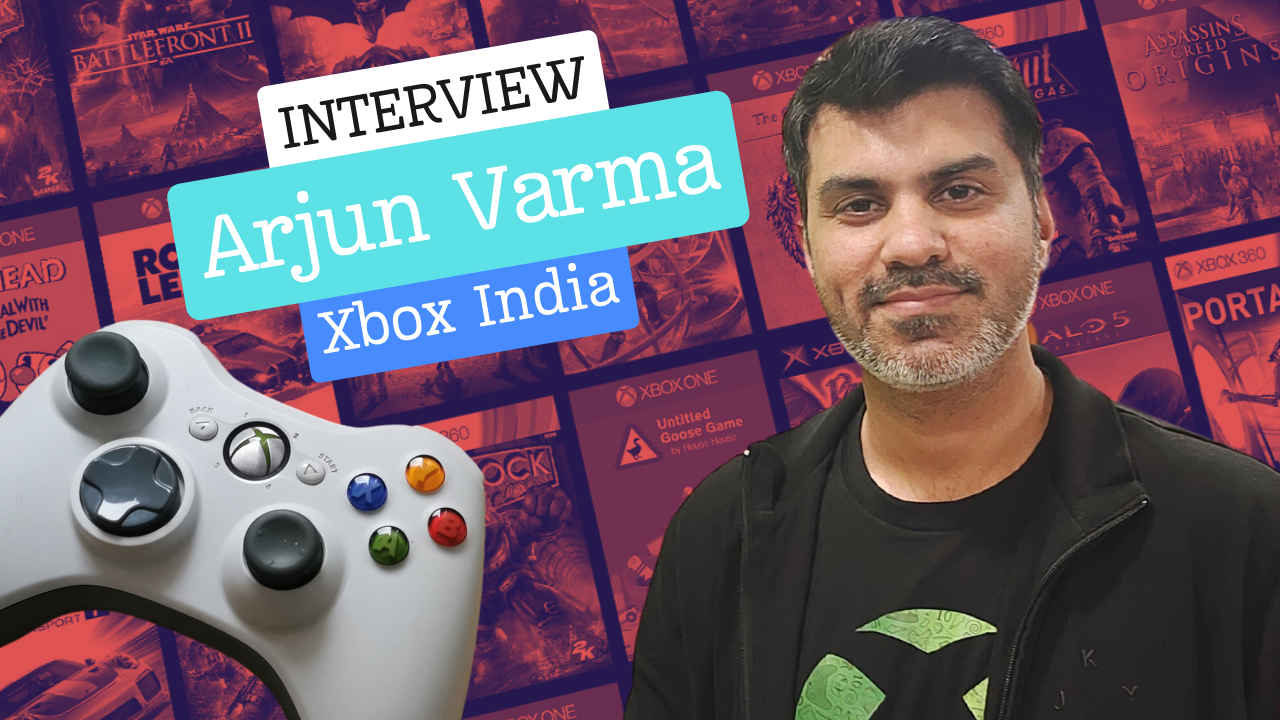Understanding Xbox’s vision for Indian Gaming with Arjun Varma

India’s gaming landscape is evolving in more ways than one, according to Xbox India’s Arjun Varma. The fact that hundreds of millions of gamers are playing their favourite games across various platforms isn’t something new. However, not many people know about more Indian game studios and indie developers creating games based on India, with an increasingly Indian flavour – something that Varma is only too encouraged to see.
 Survey
Survey“That’s one of the positive trends that I’m seeing, where even if a game conceptualised by Indian studios or Indian developers caters to a global audience, they make sure that there are some local flavours, some Indian elements in it as well,” says Arjun Varma, Xbox Global Expansion Manager, India.
I spoke with Varma on the sidelines of ID@Xbox showcasing some upcoming game titles from partner studios across Asia. Varma’s work in India is part of a broader initiative by the Global Expansion team at Xbox, focusing on “supporting emerging markets of gaming” and bringing diverse content to the global platform.

“The basic objective of my role is to connect and engage with game developers and studios across India and to help and support these developers with all the Microsoft and Xbox tools and resources we have, to help them get their games completed and released on the Xbox platform, right? So that is essentially what we are trying to do to kind of support this ecosystem and nurture it,” Varma says. And that is essentially what he’s been doing over the last two years, connecting with studios from different parts of India – through proactive outreach in industry events, through Xbox hosted events or through incoming requests he gets on social media. Yes, quite a few game devs just reach out to Varma directly, requesting him to take a look at their game or gaming projects.
Also read: Not just a quick Glance: Piyush Shah on India’s growing smartphone habit
Just like Varma is the point man for Xbox here in India, “We have my counterparts in Southeast Asia and Africa who are also doing the same thing, looking for interesting games and game makers to support and highlight. The idea for Xbox is to look at supporting emerging markets of gaming and essentially see how we can get all this amazing diverse content that is being created in these markets, such as India, and put those games and developers on the global platform,” says Varma. Reach out to the larger part of the world and make sure that games from underrepresented regions are also able to make it the global platform for a global audience. That is essentially the key strategy behind the Xbox Global Expansion team.
The aim is to showcase games from underrepresented regions like India on a global scale, ensuring a wider audience for these unique narratives. It helps uncover games like Brocula, from Indian game creator and founder of Destroyer Doggo, Prateek Jadhwani. It’s a cute-little game that’s about to be released very soon, thanks to four years of effort from Jadhwani, and some timely help from ID@Xbox’s Developer Acceleration Program (DAP).

“Brocula was one of the first games that I saw when I took this role at Xbox and Microsoft India,” remembers Varma. There are currently five studios from India (including Destroyer Doggo / Brocula) as DAP partners, and more under-review. According to Varma, DAP is a great partnership mechanism to help the game developer community grow and scale via mentorship, guidance, tech, marketing support etc. along with a component of seed funding.
Discussing the indie game development scene, Varma points out a slow but steady shift towards PC and console gaming in India, diverging from the mobile gaming dominance. This shift is creating opportunities for developers to cater to an audience craving cinematic, story-driven experiences. Varma observes, “There is a lot of new content that is being created leveraging the unique factor of diversity of India for gamers who want to play these large, cinematic story driven narrative driven games on their devices.” This trend reflects a growing desire among Indian developers to infuse local elements and Indian mythology into their games, ensuring their cultural richness is represented on the global stage. “So even if they have a game aimed to cater to or be relatable to a global audience, they do kind of make sure that there are some local flavours, some Indian elements to it as well,” says Varma.
Having said that, there’s also a section of indie game developers in India that’s aiming for universal appeal in terms of their storytelling, art, and narrative. “I mean, if you see a game like Brocula, a 2D pixel-art driven game, it’s something that would be so relatable and unique to audiences all around the world. And that’s the positive trend that I’m seeing here in India, that there is a diversity of games being created,” emphasises Varma.
The gaming industry’s consumer base is also undergoing a transformation, according to Varma, as gaming is increasingly becoming a part of family entertainment, moving beyond its previous perception as a pastime for the younger demographic. That wasn’t always the case, explains Varma, while growing up in the 1980s.

“Back then for any typical middle class Indian family, the main motivation would be to spend money that would provide entertainment to all members of the family equally, right? So whether it was buying a television or getting cable or satellite channels, all of that stuff was fine. But buying, say, a video game console unit would only provide entertainment to say one or two members of the family, which would be the younger ones, and people would be very cognizant of that,” recollects Varma, from his own experiences growing up as a millennial. But that sentiment is changing rapidly, he feels.
“I think gaming now provides diverse content in the form of different games to play, whether it’s puzzles, action or adventure, simulation and beyond, it caters to everyone. Families are making sure that gaming is part of entertainment for all family members as well,” he emphasises, reflecting on the changing times and greater acceptance towards gaming. From consuming content for entertainment purposes to considering gaming as a feasible career option – whether it’s game development, streaming or esports – this change is indicative of a broader acceptance of gaming as a legitimate and inclusive form of entertainment, catering to all age groups and interests.
A particularly encouraging trend is the rising participation of women in the gaming sector, both as creators and gamers in India. According to Varma, this trend is crucial for breaking stereotypes and opening up the gaming industry to a wider talent pool.
Also read: Inside Ubisoft: Unveiling the Craft Behind Skull and Bones
“Without a doubt, I think there’s been rapid growth in terms of women’s participation in the gaming industry in India. There are hugely talented, accomplished women currently who are in exceptional leadership roles in Indian gaming companies and also women who are gamers, who are streamers as well. This is an encouraging trend,” says Varma, especially when several stereotypical factors are now being transformed – be it parents’ acceptance of the number of opportunities to carve out a career in gaming for women in India. Just the amount of games being developed out of India is a testimony to this fact, among other things.
While sharing his personal gaming preferences, Varma reflected on the classics that shaped his early gaming experiences and his current interest in trying out games from Indian developers. “I grew up playing the classics like Mario and Contra, and these days I wish I had a lot more time on my hands to keep trying different games,” says Varma. While he tries to sample every game that he comes across, currently he’s busy trying his hand at games being developed by Xbox’s partner studios and developers here in India.

“The demos they share, I want to really try and play them again and again to see how much it really kind of engages me to get an idea about how a wider audience would also react to it, because I’m so nervous. A lot of our games that we partnered with in India are slated for release in FY 24-25, right? I want all of these games to succeed, and kind of really put India on the map in terms of the Xbox platform. So those are the kind of games I’m currently playing – these are 2D pixel art games, RPGs, one of them is an action adventure game, another is a Metroidvania side scrolling game. Really excited for them to launch soon,” Varma says with a nervous smile.
Xbox is also focusing on educational initiatives to bolster the gaming ecosystem in India. The recently launched Game Camp Asia, an education-focused program for game developers, is one such initiative that Varma is excited about. “In terms of formats, a lot of these developers are looking at cross platform releases of their games, which from a business perspective ensures their game reaches a big audience. And that is the way to go making sure that the games that are developed, whether it’s PC first, console first or mobile first, at the end of the day they should be available on all devices. The game should be available for every screen for everybody to play, and that’s a key component for all our endeavours,” according to Varma.
Does he view mobile gaming as a threat? Hardly. Different gaming platforms complement each other more often than not, affirms Varma. “I think there’s space for all kinds of gaming content and all kinds of platforms to really thrive in the Indian gaming industry. When you talk about PC and console space, even though it’s currently at a smaller scale (compared to mobile gaming), there is a huge section of this audience that would welcome and would want to get involved with more games that could be played on, say, a PC or a console,” according to Varma. And that’s where he’s focusing his energy, as the Indian gaming landscape continues to evolve, clearly demonstrating that Xbox wants to play its part in this transformation, ensuring that games from India receive the global audience they deserve.
Jayesh Shinde
Executive Editor at Digit. Technology journalist since Jan 2008, with stints at Indiatimes.com and PCWorld.in. Enthusiastic dad, reluctant traveler, weekend gamer, LOTR nerd, pseudo bon vivant. View Full Profile